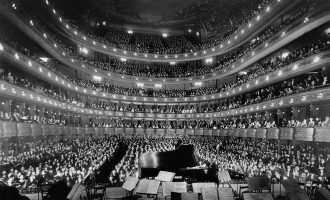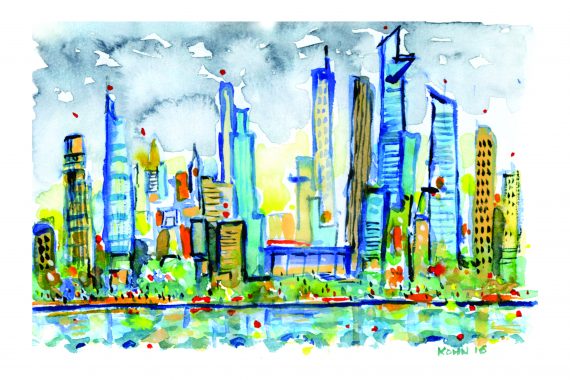Within his watercolor landscapes, Eugene Kohn can briefly slip away from his surroundings. He can also escape his clients.
“As an architect you have a client, a budget and a time schedule,” he said. “When I paint on the weekends, I don’t have a client, I don’t have anyone telling me what to do.”
For Kohn, co-founder and chairman of the international architecture firm Kohn Pedersen Fox Associates [TRDataCustom], painting landscapes, still-lifes and urban skylines is just a hobby. He’s occasionally shown it off in art galleries and through Christmas cards to employees, friends and family. He said he doesn’t sell paintings for profit but will donate proceeds to charity when someone wants to buy his work.
It’s not necessarily unusual for an architect to dabble in the fine arts. Starchitect Bjarke Ingels, for example, grew up wanting to illustrate comic books and even released a book describing his firm’s philosophy as a comic. Other architects in the city, however, have gravitated to projects well-outside the design world.

Metropolitan Opera House
Gene Kaufman, a prolific hotel architect, is producing an opera with his wife, titled “Mila,” which is about a Tibetan yogi and poet. Kaufman’s interest in opera runs deep. His wife is a professional pianist, and they are both avid theatergoers. He also bid to revive the bankrupt New York City Opera, though he ultimately backed out of the competition. A date has not yet been set for his opera’s release.
“The lifecycle of putting together an opera is even longer than putting up a building,” he joked during a recent interview with The Real Deal.
Liz Diller, whose architecture firm helped design the High Line, is also working on an opera. Dubbed the “Mile Long Opera,” the show is expected to open in 2019. She’s collaborating with composer David Lang on the show, which will take place along the High Line, though details are sparse. Diller recently said the opera was partly inspired by a woman who performed one-woman cabarets — called the Renegade Cabaret — on her fire escape a few yards away from the park.
Diller’s no stranger to work that’s outside her architectural purview. She and her firm also helped director Spike Jonze design futuristic Los Angeles for his movie “Her.”
Kaufman said it’s not that surprising that he and Diller were drawn to working on operas.
“I think architects as visual people and as cultural people are drawn to visual art forms,” he said. “That being said, this is something that’s so time consuming so I wouldn’t be surprised if we were the only ones.”

Italian honey bees
Meanwhile in Midtown, CookFox tends to its swarm of Italian bees. The firm keeps roughly 40,000 bees on its office’s terrace on the 17th floor of 250 West 57th Street. There are 16 people in the studio who harvest 30 to 40 pounds of honey from the hives every year. They distribute the honey to others in the studio.
“We started keeping bees on our roof as an extension of our studio’s interest in biophilic design, rooftop ecosystems and urban agriculture,” said Jared Gilbert, a spokesperson for the firm. “We believe that having access to nature in the workplace is critical to the health and well-being of our studio.”
Kohn thinks architects have a knack for picking up creative skills outside their usual realm. He noted that he’s always wanted to learn how to compose music. Though he hasn’t, he sees the role of architects and music composers as similar.
“We both start with a blank piece of paper,” Kohn said. “As a designer, architects see it in their mind. They image what they want to create. The same is true for a musician or an artist.”
